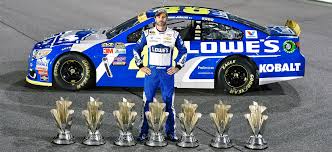In the adrenaline-fueled world of motorsports, where speed, swagger, and showmanship often define greatness, Jimmie Johnson carved a different path. Known for his humility, work ethic, and relentless consistency, Johnson is one of NASCAR’s most iconic figures. With seven NASCAR Cup Series championships, he shares the all-time record with only two other legends Richard Petty and Dale Earnhardt. Yet, Johnson’s approach and impact have been uniquely transformative.
From Motocross to Motorsports Elite
Born in El Cajon, California, Johnson didn’t follow the typical NASCAR route. His racing career began not on asphalt but on dirt tracks in motocross. His talent was evident early, and by the late 1990s, he had transitioned into stock car racing. He debuted in the NASCAR Cup Series in 2001 with Hendrick Motorsports, and by 2002, he had already won his first race. But it wasn’t just his speed that impressed it was his poise, his discipline, and his ability to think several laps ahead.
The Dynasty Years: 2006–2010
Between 2006 and 2010, Jimmie Johnson did what no driver in NASCAR history had done win five consecutive championships. This period wasn’t just about dominance; it was about strategic brilliance and near-flawless execution.
Johnson and his crew chief Chad Knaus formed what many consider the most effective driver-crew chief duo in the history of the sport. Their synergy turned Hendrick Motorsports into a dynasty and reshaped how NASCAR teams approached preparation, data analysis, and team dynamics.
Johnson’s cars were rarely the fastest in qualifying, but come race day, his ability to conserve tires, manage fuel, and make clutch moves in the final laps became his trademark. He thrived under pressure, often making decisive passes in the last stages of a race, earning him a reputation as one of the smartest racers on the track.
Changing the Culture of NASCAR
Before Johnson’s rise, NASCAR was as much about personality as performance. Drivers like Earnhardt and Tony Stewart were revered for their aggressive styles and outspoken nature. Johnson, however, brought a more corporate, composed, and disciplined image. Some critics initially dismissed him as “too vanilla,” but his sustained excellence silenced doubters. In fact, he forced NASCAR to evolve ushering in a new era focused on fitness, mental preparation, and strategic consistency.
Off the track, Johnson was a model ambassador for the sport. Always respectful, articulate, and team-focused, he helped broaden NASCAR’s appeal, especially to new markets and younger fans. He also made a point to stay grounded, often crediting his team for his success and avoiding the spotlight that so often surrounds sports megastars.
Venturing Beyond NASCAR
When Johnson announced his retirement from full-time NASCAR racing in 2020, many assumed he would fade into the background of the motorsports world. Instead, he did the opposite. He transitioned into IndyCar, embracing the challenge of open-wheel racing in his mid-40s an age when most drivers are thinking about legacy, not reinvention. Though he didn’t achieve the same level of success in IndyCar, his willingness to step outside his comfort zone earned him widespread admiration.
In 2023, Johnson also participated in the 24 Hours of Le Mans as part of NASCAR’s Garage 56 project, showcasing once again his commitment to pushing boundaries and representing the sport on a global stage.
Legacy: More Than Just Numbers
Jimmie Johnson’s record speaks for itself:
- 83 career NASCAR Cup wins
- 7 Cup Series championships
- 5 straight titles a feat that may never be matched
- Winner of marquee events like the Daytona 500, Brickyard 400, and Coca-Cola 600
But his real legacy lies in how he elevated the expectations of what it means to be a race car driver. Johnson showed that humility and dominance can coexist, that winning can be methodical as much as it is explosive, and that true greatness is measured not just in victories, but in the integrity of the pursuit.
In a sport fueled by horsepower, Jimmie Johnson stood out for something even more powerful: enduring class and relentless excellence. He didn’t just race he redefined how champions are made.

